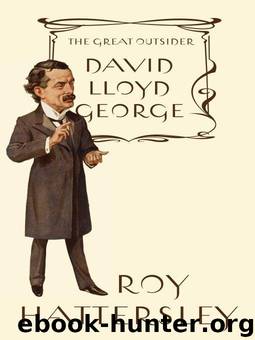David Lloyd George: The Great Outsider by Hattersley

Author:Hattersley [Hattersley]
Language: eng
Format: epub
Tags: Politics, Britain, Prime Ministers, Biography
ISBN: 9781408700976
Publisher: Little, Brown & Co.
Published: 2010-09-27T23:00:00+00:00
CHAPTER 24
THE PATRIOT
Politicians who want to avoid war have always taken refuge in wishful thinking. Speaking at the Mansion House banquet on 17 July 1914 - three weeks after the assassination of Archduke Franz Ferdinand in Sarajevo - Lloyd George reassured the City of London that the peace could be preserved.
There are always clouds in the international sky. You never get a perfectly blue sky in foreign affairs. There are clouds, even now, but having got out of the greater difficulties, last year, we feel confident that common sense, the patience, the goodwill, the forbearance which enabled us to solve the greater and more urgent problems last year will enable us to pull through these problems at the present moment.1
The Chancellor’s historical analysis was no better than his powers of prediction. The great powers of Europe had not ‘got out’ of the difficulties of 1913. The Austrians - alarmed by the military strength of Serbia which it demonstrated in its defeat of Turkey - had been persuaded not to declare war. But the underlying causes of tension remained and it seemed likely that Germany - despite having urged Austria not to make the pre-emptive strike - was determined eventually to expand to the west. The number of recruits conscripted into the German Army each year was increased from 280,000 to 343,000 men. A capital levy of 1000 million marks was devoted to the cost of military preparations. The Berlin General Staff was preparing to implement the Schlieffen Plan - six weeks to defeat France after an invasion through Belgium. Then a combined attack on Russia and the Slav states before the winter set in. On 23 July - six days after Lloyd George’s Mansion House speech - the Austrians issued an ultimatum to Serbia. It was more extreme than the Germans had anticipated. Even the milder original version would have made a general European war inevitable. Grey attempted to buy time by proposing a four-power conference but asked for the Cabinet’s agreement to announce that, if France were invaded, Britain would come to her support. The Cabinet refused to endorse his proposal.
Lloyd George provided C. P. Scott with a reassuring footnote for his diary.
No question of our taking part in any war in the first instance. Knew of no minister who would be in favour of it. But he admitted that a difficult question would arise if the German fleet were [sic] attacking French towns on the other side of the Channel and France sowed the Channel with mines.
The Chancellor then offered a bizarre suggestion which he did not claim represented the general ministerial view. Britain ‘might pair’ with Italy - an ally of Germany and Austria - in a mutual agreement to remain neutral.2
Asquith’s thoughts on the role Britain would play were barely less confused. On 24 July, in his letter to the King, he described the impending conflict as ‘the greatest event for many years past’ but he added ‘happily there seems no reason why we should be anything other than a spectator’.
Download
This site does not store any files on its server. We only index and link to content provided by other sites. Please contact the content providers to delete copyright contents if any and email us, we'll remove relevant links or contents immediately.
The Secret History by Donna Tartt(19027)
The Social Justice Warrior Handbook by Lisa De Pasquale(12182)
Thirteen Reasons Why by Jay Asher(8883)
This Is How You Lose Her by Junot Diaz(6872)
Weapons of Math Destruction by Cathy O'Neil(6260)
Zero to One by Peter Thiel(5782)
Beartown by Fredrik Backman(5734)
The Myth of the Strong Leader by Archie Brown(5491)
The Fire Next Time by James Baldwin(5423)
How Democracies Die by Steven Levitsky & Daniel Ziblatt(5211)
Promise Me, Dad by Joe Biden(5139)
Stone's Rules by Roger Stone(5078)
A Higher Loyalty: Truth, Lies, and Leadership by James Comey(4946)
100 Deadly Skills by Clint Emerson(4911)
Rise and Kill First by Ronen Bergman(4775)
Secrecy World by Jake Bernstein(4738)
The David Icke Guide to the Global Conspiracy (and how to end it) by David Icke(4696)
The Farm by Tom Rob Smith(4500)
The Doomsday Machine by Daniel Ellsberg(4481)
